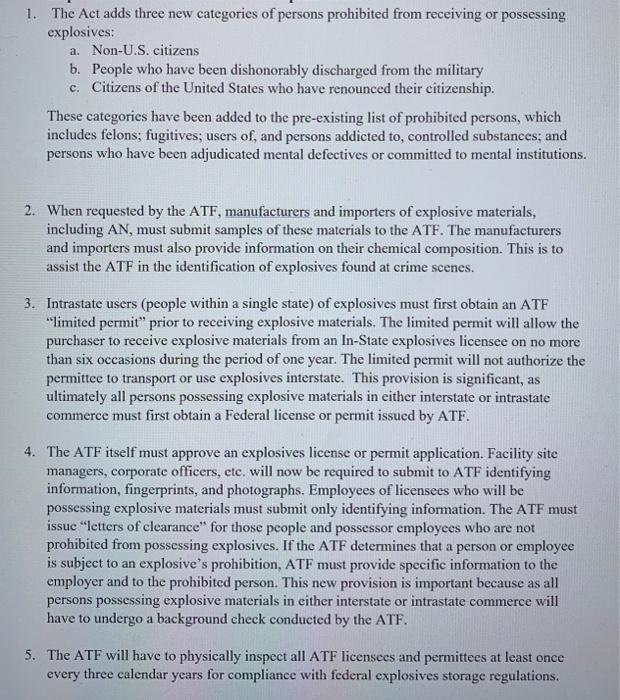1. The Act adds three new categories of persons prohibited from receiving or possessing explosives: a. Non-U.S. citizens b. People who have been dishonorably discharged from the military c. Citizens of the United States who have renounced their citizenship. These categories have been added to the pre-existing list of prohibited persons, which includes felons; fugitives; users of, and persons addicted to, controlled substances; and persons who have been adjudicated mental defectives or committed to mental institutions. 2. When requested by the ATF, manufacturers and importers of explosive materials, including AN, must submit samples of these materials to the ATF. The manufacturers and importers must also provide information on their chemical composition. This is to assist the ATF in the identification of explosives found at crime scenes. 3. Intrastate users (people within a single state) of explosives must first obtain an ATF "limited permit" prior to receiving explosive materials. The limited permit will allow the purchaser to receive explosive materials from an In-State explosives licensee on no more than six occasions during the period of one year. The limited permit will not authorize the permittee to transport or use explosives interstate. This provision is significant, as ultimately all persons possessing explosive materials in either interstate or intrastate commerce must first obtain a Federal license or permit issued by ATF. 4. The ATF itself must approve an explosives license or permit application. Facility site managers, corporate officers, etc. will now be required to submit to ATF identifying information, fingerprints, and photographs. Employees of licensees who will be possessing explosive materials must submit only identifying information. The ATF must issue "letters of clearance" for those people and possessor employees who are not prohibited from possessing explosives. If the ATF determines that a person or employee is subject to an explosive's prohibition, ATF must provide specific information to the employer and to the prohibited person. This new provision is important because as all persons possessing explosive materials in either interstate or intrastate commerce will have to undergo a background check conducted by the ATF. 5. The ATF will have to physically inspect all ATF licensees and permittees at least once every three calendar years for compliance with federal explosives storage regulations. 1. The Act adds three new categories of persons prohibited from receiving or possessing explosives: a. Non-U.S. citizens b. People who have been dishonorably discharged from the military c. Citizens of the United States who have renounced their citizenship. These categories have been added to the pre-existing list of prohibited persons, which includes felons; fugitives; users of, and persons addicted to, controlled substances; and persons who have been adjudicated mental defectives or committed to mental institutions. 2. When requested by the ATF, manufacturers and importers of explosive materials, including AN, must submit samples of these materials to the ATF. The manufacturers and importers must also provide information on their chemical composition. This is to assist the ATF in the identification of explosives found at crime scenes. 3. Intrastate users (people within a single state) of explosives must first obtain an ATF "limited permit" prior to receiving explosive materials. The limited permit will allow the purchaser to receive explosive materials from an In-State explosives licensee on no more than six occasions during the period of one year. The limited permit will not authorize the permittee to transport or use explosives interstate. This provision is significant, as ultimately all persons possessing explosive materials in either interstate or intrastate commerce must first obtain a Federal license or permit issued by ATF. 4. The ATF itself must approve an explosives license or permit application. Facility site managers, corporate officers, etc. will now be required to submit to ATF identifying information, fingerprints, and photographs. Employees of licensees who will be possessing explosive materials must submit only identifying information. The ATF must issue "letters of clearance" for those people and possessor employees who are not prohibited from possessing explosives. If the ATF determines that a person or employee is subject to an explosive's prohibition, ATF must provide specific information to the employer and to the prohibited person. This new provision is important because as all persons possessing explosive materials in either interstate or intrastate commerce will have to undergo a background check conducted by the ATF. 5. The ATF will have to physically inspect all ATF licensees and permittees at least once every three calendar years for compliance with federal explosives storage regulations







